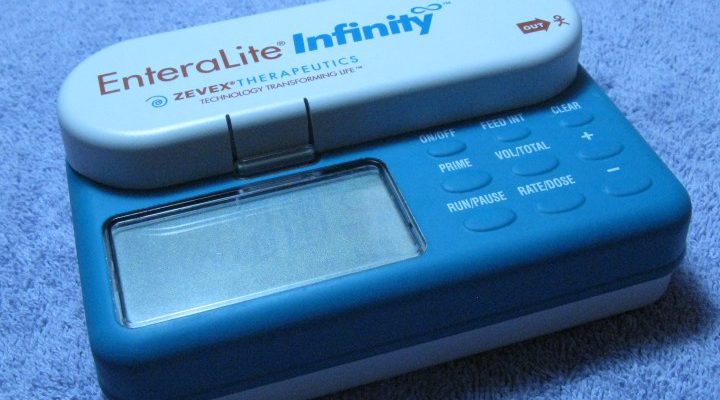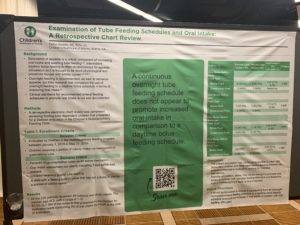
Transitioning Away From Overnight Feeds
Almost daily here at Real Food Blends, we get asked if our meals can be used for overnight feeds or if they can put the meals on ice to feed overnight or if the meals can go through a pump to be fed overnight….
Wait, what? Eating while sleeping??
 When you start to think in terms of MEALS and less in terms of FEEDS, feeding overnight starts to sound a little strange. Oral eaters don’t have to wake up every night to eat, right? And many would argue that our digestive systems need to rest at night.
When you start to think in terms of MEALS and less in terms of FEEDS, feeding overnight starts to sound a little strange. Oral eaters don’t have to wake up every night to eat, right? And many would argue that our digestive systems need to rest at night.
For some people, the idea of NOT feeding overnight is super scary – “How will we ever hit our calorie goal? We can’t get that volume amount in during the day!” These questions are almost always from those who are 100% formula fed. (Requiring overnight feeds can be a sign of formula intolerance however some conditions require so many extra calories that overnight feeds are a must – cystic fibrosis is one that comes to mind immediately – but we’re speaking in generalities here!)
To our knowledge no one has really studied this, but in our experiences and from a lot of anecdotal “evidence,” overnight feedings can lead to volume intolerance during the day (especially in the morning – who’d want to eat breakfast after eating all night?), increased risk of reflux/aspiration (usually due to not being upright for eating, you try to eat laying down and see how you feel!), disrupted sleep, and scary episodes of vomiting/choking.
If the only reason you or the person in your life with a feeding tube requires overnight feeds is to hit a calorie goal, read on:
Real Food
The first tip we’d offer is to introduce real food into the tube-feeding diet. Real Food Blends meals are thicker than formula in part to provide more nutrition and calories per ounce, making it easier to meet your calorie needs in a shorter amount of time. (There’s also some evidence that volume tolerances increase with real food.) Real food can be used alone or with formula and transitioning someone who has been exclusively on formula for any amount of time should be done slowly (read more about how to transition from formula to a real food diet. See also: Is Real Food Right For Me?)
Normal Mealtime Schedule
We like having a goal to move to a normal mealtime schedule – breakfast, lunch, snack, dinner – when transitioning to real food. Again, if you think about this from an evolutionary perspective, this is how humans have been eating for ages! This transition should be done slowly and over time—you may want to gradually increase the amount of food given during the day and slowly decrease the amount of formula given overnight. The more calories you can get in during the day, the fewer you’ll have to give during an overnight feed, with the goal of getting all your necessary calories in during waking hours (like humans have been doing for ages!)
Think Midnight Snack
While making this transition, giving a small bolus feeding at night instead of a continuous overnight feed might be helpful. Think of it more as a “midnight snack”—the stomach still gets to rest during most of the night and you have another opportunity to get some extra calories in while you’re transitioning away from overnight feeds.
Volume
If volume is a concern, we suggest going slow and adding additional volume in small increments during the day, perhaps starting out with just an additional half an ounce per meal. Many people have found that giving free water prior to a meal can help increase volume tolerance as well—make sure to discuss hydration needs with your medical team. See also: Tube Feeding and Volume Intolerance
“I have had my feeding tube for almost 4 years now. I had tried multiple different formulas that were just marking me very sick so I would just go without food. I tried just making home blends but was struggling to balance the vitamins and calories so I was still getting sick. I tried Real Food Blends and the difference was night and day no more reflux no more heart burn.”
- RFB customer Kim Inslee-Pomerleau
What’s your experience with overnight feeds been? Have you been able to successfully transition off the tube at night? We’d love to here your feedback here or on Facebook.
*****
As always, please talk to your doctors before making any changes to your tube-feeding diet. This is not to be considered medical advice.








I have NEVER believed in over night feeds for my little man… He is 2yrs old and has had a feeding tube since he was 4mo due to a mental issue causing him not being able to swallow and aspirated.. I have been following your FB page for a while and would love to start him on real foods as I feel it would help him develop better.. Just not sure where to start.